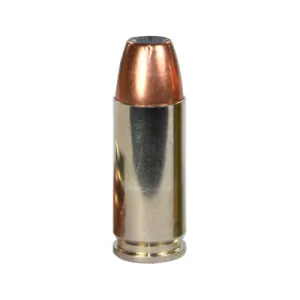
The .38 Super has traveled a rather rocky road during its 121-year history. Due to its ballistic performance, accuracy in modern guns, wide selection of components and ease with which top-notch handloads can be assembled, it has become popular for action pistol competition, defense and field use. The addition of the “Automatic +P” designation in 1974 helped differentiate it from the old .38 Automatic Colt. The history of the .38 Super starts around 1897 with the development of the .38 Automatic Colt cartridge (.38 Rimless Smokeless) designed for the Colt Model 1900 Automatic Pistol. Early advertising listed a 130-grain FMJ bullet at around 1,040 fps, which was later increased to 1,070 fps. This cartridge was designed at least five years prior to the 9mm Luger.
During the 1920s there was growing demand for handgun cartridges that could better penetrate car bodies, so in 1928 Colt responded with the .38 Super Automatic in its Model 1911. Essentially, the Super was dimensionally the same as the .38 Automatic Colt, including bullet weight and profile. However, being chambered in the notably stronger Model 1911 pistol, it could be loaded to much greater pressures, with velocities pushing 130-grain bullets to 1,300 fps by 1933. Pressures were increased from 23,000 CUP to 33,000 CUP. For clarification, the .38 Super should never be fired in comparatively weak Model 1900 pistols, which can be disastrous.
The Super had another significant problem: It produced poor to mediocre accuracy at best. There were several contributing factors that included a bullet diameter specified at .356 inch while barrel groove diameters were known to measure .355, .356 and .357 inch. Period Colt Government Model pistols were not built with proper tolerances to achieve top accuracy. However, the largest single obstacle was Colt’s chamber specifications that resulted in poor headspace control. The .38 Super originally fired a 130-grain bullet at 1,215 fps, but by 1933 velocity was bumped to 1,300 fps before it was eventually standardized at 1,280 fps. Remington and Winchester list 130-grain FMJ loads at the original 1,215 fps while Federal offers the same bullet weight at 1,200 fps. Several smaller companies such as Buffalo Bore offer loads containing 115-grain and 124-grain JHP bullets at 1,415 fps and 1,350 fps, respectively.





